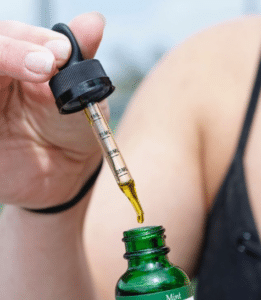
Understanding the CBD market requires knowing a range of terms that can confuse beginners. One common misconception is the difference between hemp oil and CBD oil. The reality is that CBD oil and hemp oil are two totally different things. If you don’t know how to determine the difference between the two, you can get conned into a product that’s totally ineffective for your needs.
Why These Terms Can Get Confusing
CBD and hemp are often used interchangeably on the market.
CBD is the dominant compound in the flower of the hemp plant. Hemp is the plant that contains CBD, along with other cannabinoids like CBN (cannabinol) and CBG (cannabigerol), plus terpenes, flavonoids, and even a surprising variety of nutrients. All of these compounds are fine for human consumption, and possess additional properties that can enhance the effects of CBD.
A lot of products on the market labeled as “CBD oil” contain more than just cannabidiol. They may contain a full spectrum or broad spectrum hemp extract which means that they contain multiple cannabinoids and terpenes. Then, there is hemp oil, which comes from hemp seeds and does not contain any CBD.
CBD Oil
CBD oil is a term used to refer to any type of oil product that contains cannabidiol. A CBD oil can include only cannabidiol, or lots of hemp compounds based on the type of hemp extract in the formula. You can expect products made from CBD isolate to include CBD only, and maybe some terpenes from a flavoring. Full spectrum and broad spectrum oils contain CBD in addition to other cannabinoids, as well as various terpenes. Regardless of the extract, CBD oil comes in a dropper bottle and is traditionally taken by mouth.
CBD exists in the flowering buds of the hemp plant. The buds – or flowers – contain the rich array of compounds we seek out for therapeutic purposes, including cannabidiol. CBD oil is actually a pure hemp concentrate diluted in a carrier oil, which is why it comes in various milligram strengths. It is a common misconception that if you see “hempseed oil” in the product’s ingredients list, then it doesn’t have CBD in it. But, this is not true. Since concentrated CBD is sticky, resinous, and hard to work with, it is diluted in a carrier oil for ease of use. Hempseed oil is one popular carrier oil, alongside coconut, grapeseed, and olive oils.
Pros
#1: Rich in CBD
CBD oil is high in cannabidiol, as it is the dominant chemical compound found in the buds of the hemp plant. CBD has been studied for its various beneficial effects. It is a cannabinoid that can promote homeostasis by regulating your body’s endocannabinoid system, a network of chemical receptors responsible for modulating things like sensation, sleep, and metabolism.
#2: Rich in Other Cannabinoids
CBD oil that is made with a broad or full spectrum extract contains a rich array of cannabinoids besides CBD, and we know that each cannabinoid offers distinctive effects to the body that can be considered useful.
#3: Rich in Terpenes
CBD oil can also be high in a variety of terpenes. Terpenes are secondary compounds found in the flowering buds, which offer properties of their own that can be desirable. Due to their strong scents and tastes, they give the plant its unique flavor and aroma.
#4: Rich in Nutrients
The buds of the hemp plant contain an array of phytonutrients including vitamins, essential fatty acids, and amino acids.
Cons
#1: May Contain a Trace Amount of THC
Full spectrum hemp contains a trace amount of THC. This amount is low enough to be legal, and and non-intoxicating. Those who wish to avoid THC altogether can choose a CBD oil made with CBD isolate – which is pure cannabidiol, or broad spectrum hemp extract – which contains a cannabinoid blend without THC.
#2: Not Suitable as a Cooking Oil
CBD oil may sound like a great choice for frying up your eggs, but it’s not intended for this purpose. First, there are far cheaper cooking oils. Secondly, high heat breaks down hemp compounds and makes them become ineffective. There are ways to incorporate CBD oil into low or no heat cooking or baking recipes, however.
Hemp Oil
Hemp oil is entirely different from CBD oil. While CBD oil comes from the flowering buds of the hemp plant, hemp oil comes from the seeds, which is why it’s also commonly referred to as hempseed oil.
Pros
#1: Rich in Nutrients
Hemp oil is also rich in nutrients. It contains a rich array of vitamins, amino acids, and essential fatty acids. It’s one of the most nutrient-dense cooking oils available.
#2: Great for Cooking
Unlike CBD oil, hempseed oil can handle higher temperatures without degrading.
Cons
#1: Does Not Contain CBD
Hempseed oil does not contain cannabidiol, because the hemp seeds do not have any CBD content.
#2: Does Not Contain Any Other Cannabinoids
Hempseed oil does not contain any cannabinoids, in fact, because there are no cannabinoids in the seeds of the hemp plant.
#3: Does Not Contain Terpenes
Terpenes are also lacking in hemp’s seeds, and so hemp oil does not contain the the variety of terpenes you would expect in CBD oil.
#4: Does Not Have Therapeutic Value
Although it contains a variety of essential nutrients, hemp oil does not offer any of the therapeutic properties that CBD oil does.
The Choice is Yours
Hemp oil and CBD oil both have their time and place. If you’re seeking out a CBD product specifically, you will need to buy CBD oil. Only CBD oil contains cannabinoids, terpenes and other unique compounds found in the flowers of the hemp plant. However, hempseed oil is a great choice for culinary purposes, so there is absolutely nothing wrong with having a bottle of each in your home for different uses. Always remember, hempseed oil can be an ingredient in CBD oil products, but pure hempseed oil will never have CBD.
